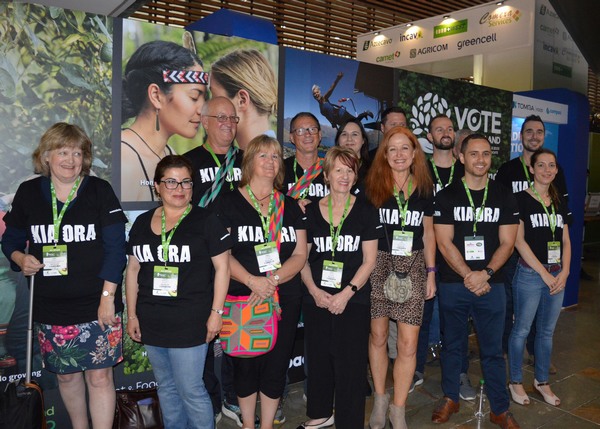New Zealand Avocado says the global industry needs to create best practice so the fruit is grown in ways that consumers know are sustainable.
Chief Executive, Jen Scoular told the World Avocado Congress in Columbia that the industry is growing, particularly in New Zealand, and the fruit is increasing in popularity with consumers. But not enough steps are being taken to ensure that messages are being sent to the public with enough research.
"Sustainability must be very much a part of the plans that we make and we must be looking at how we do this; what the impact on the environment, on the people, and on the economies are," she said. "What we are learning from our forebears is that they have, for hundreds of years, valued their people and the environment. They are not making five year plans, as we are. They are making 100 year plans. What we need to do is make sure that we look after our people, environment and economies to ensure this industry is healthy in 100 years."
 Jen Scoular with the NZ delegation at WAC
Jen Scoular with the NZ delegation at WAC
The New Zealand avocado industry has 1,400 growers and is based on the North Island in a temperate environment, with a production area of 4,000 hectares that is currently active. There are a lot of small orchards, and Ms Scoular says her organisation has a number of standards it has to set; including a dry matter requirement of 24 per cent, ensuring all chemical use is recorded and has an "AvoGreen" program for responsibly grown avocados.
Ms Scoular says that orchard gate return has gone up, ensuring growers have a reasonable income, and growing the fruit is good for businesses as well as the national economy.
"We are happy with the economics and the growth we have had in our industry, particularly in the last five years. What we need to ensure is that growth carries forward, and I don't believe it can without looking after our people, land and economy. We also need to look at what other markets want our delicious, versatile and delicious avocados. So, we are developing Asian markets, and we are doing that collectively with our exporters, ensuring our growers are aware what they need to grow for all-market access."
She added that the New Zealand market has around 15 competitive marketers, but until nearly 7 years ago there was no value. Growth in terms of volume is not increasing significantly, but the value is "going up fantastically", which Ms Scoular believes is being driven by sharing data and information, and learning from it. One example, is the recording of performance and consistency of irregular bearing yields.
"Every orchard is recorded and their performance is rated standard, good or best," Ms Scoular said. "We measure that to make sure that our research is getting out to growers and they are adopting it, so that their orchards are performing ideally. When we measured the performance of 83 orchards in one area (Bay of Plenty), we found that orchards right next door to one another were performing very differently. So, it wasn't the environment; what was happening was orchard management. Since then, we have been able to tie in what practices need to change, and growers are learning to take them up to improve productivity."
Email: [email protected]
